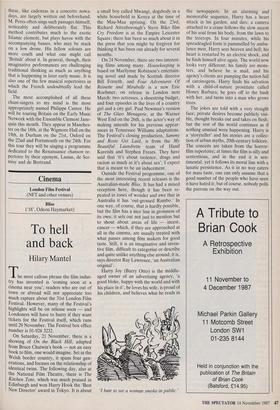Cinema
London Film Festival (NFT and other venues) Bliss
(`18', Odeon Haymarket)
To hell and back
Hilary Mantel
The most callous phrase the film indus- try has invented is 'coming soon at a cinema near you'; readers who are out of town or abroad will not appreciate too much rapture about the 31st London Film Festival. However, many of the Festival's highlights will be on release soon — and Londoners will have to hurry if they want tickets for the Festival itself, which runs until 29 November. The Festival box office number is 01-928 3232.
On Saturday, 21 November, there is a showing of On the Black Hill, adapted from Bruce Chatwin's book — not an easy book to film, one would imagine. Set in the Welsh border country, it spans four gen- erations, and focuses on the relationship of identical twins. The following day, also at the National Film Theatre, there is The Kitchen Toto, which was much praised in Edinburgh and won Harry Hook the 'Best New Director' award in Tokyo. It is about a small boy called Mwangi, dogsbody in a white household in Kenya at the time of the Mau-Mau uprising. On the 23rd, Richard Attenborough's Steve Biko film Cry Freedom is at the Empire Leicester Square; there has been so much about it in the press that you might be forgiven for thinking it has been out already for several months.
On 24 November, there are two interest- ing films among many. Housekeeping is based on Marilynne Robinson's entertain- ing novel and made by Scottish director Bill Forsyth, and Four Adventures Of Reinette and Mirabelle is a new Eric Roehmer, on release in London next March: two actresses, a shoestring budget, and four episodes in the lives of a country girl and a city girl. Paul Newman's version of The Glass Menagerie, at the Warner West End on the 26th, is the actor's way of making amends for his previous appear- ances in Tennessee Williams adaptations. The Festival's closing production, Sammy and Rosie Get Laid, is from the My Beautiful Laundrette team of Hanif Kureishi and Stephen Frears. They have said that `it's about violence, drugs and racism as much as it's about sex'; I expect that is meant to be an inducement.
Outside the Festival programme, one of the most interesting recent releases is the Australian-made Bliss. It has had a mixed reception here, though it has been re- peated in tones of wonder and awe that in Australia it has 'out-grossed Rambo.' In one way, of course, that is hardly possible, but the film has a nice line in grossness of its own; it sets out not just to mention but to shout about areas of life — incest, cancer — which, if they are approached at all in the cinema, are usually treated with what passes among film makers for good taste. Still, it is an imaginative and inven- tive film, difficult to categorise or describe and quite unlike anything else around; it is, says director Ray Lawrence, 'an Australian original'.
Harry Joy (Barry Otto) is the middle- aged owner of an advertising agency, 'a good bloke, happy with the world and with his place in it', he loves his wife, is proud of his children, and believes what he reads in 'I hate to see a woman smoke in public.' the newspapers. In an alarming and memorable sequence, Harry has a heart attack in his garden, and dies; a camera attached to a crane follows the slow ascent of his soul from his body, from the lawn to the treetops. In four minutes, while his spreadeagled form is pummelled by ambu- lance men, Harry sees heaven and hell; his heart is restarted by an electric shock, and he finds himself alive again. The world now looks very different; his family are mons- ters, and believe he is mad, and his agency's clients are pumping the nation full of carcinogens. Harry finds his salvation with a child-of-nature prostitute called Honey Barbara; he goes off to the bush with her, and turns into a man who grows trees.
The jokes are told with a very straight face; private desires become publicly visi- ble, thought breaks out and takes on flesh, but the rest of the world continues as if nothing unusual were happening. Harry is a 'storyteller' and his stories are a collec- tion of urban myths, 20th-century folklore. The conceits are taken from the horror- film repertoire; at times the film is silly and sententious, and in the end it is sen- timental, yet it follows its moral line with a lunatic persistence. As it in no way caters for mass taste, one can only assume that a good number of the people who have seen it have hated it; but of course, nobody polls the patrons on the way out.










































































 Previous page
Previous page